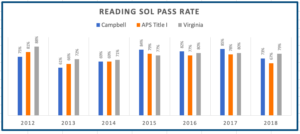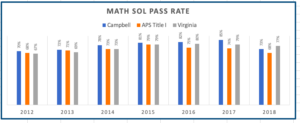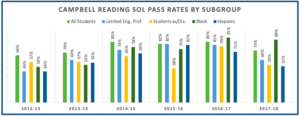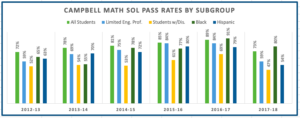Campbell, a school with a unique and diverse student population that significantly differs from their district and the state, increasingly outperforms the state and other Title I schools within the district.
Overview
The Standards of Learning (SOL) assessment is given to all students in grades 3-5. From 2012 to 2017, Campbell test scores steadily rose in reading and math. Since 2012, Campbell has met the requirements to be fully accredited by the Virginia Department of Education. Campbell has also met the federal requirements under Every Student Succeeds Act (ESSA), including the Annual Measurable Objectives (AMOs).
Standards of Learning Data
The achievement data, as measured by the SOL assessment, shows that Campbell students are passing grade level assessments at a higher rate than they did in the past. The trajectory for both overall pass rates and subgroup pass rates is upward. The tests themselves and the conditions of exemptions remained fairly consistent from 2012 to 2017.
In the 2017-18 school year, students at early stages of English acquisition were no longer allowed to use Virginia Grade Level Alternative (VGLA) as an alternate assessment to the Reading SOL. This new policy disproportionately impacted schools, like Campbell, with high numbers of Limited English Proficient (LEP) students. As compared to other Title I schools, in Arlington Public Schools (APS), Campbell’s pass rate was still higher. In the same 2017-18 school year, the rigor on the math SOL increased as well, which caused a decline in this area.
Click graph for larger view.
The above graphs show that Campbell academic performance was below the district Title I schools and state in 2012, but gradually improved over the next 5 years. By 2015, Campbell was outperforming both state and district Title I schools in reading and math. The graphs also show that not only did Campbell experience a decline in 2018, but so did other APS Title I schools and the state average.
SOL Subgroup Performance
During the period from 2012 to 2017, when the testing conditions remained constant, the subgroup performance rose. The achievement gap was reduced. Black, Hispanic and LEP students all made at least a 30 percentage point gain in the pass rate in reading. A similar pattern occurred in math. The overall student pass rate in reading and math increased, as did the subgroup pass rates.
PALS Data
The Phonological Awareness Literacy Screening (PALS) assessment, developed by the University of Virginia, is used in most Virginia districts to assess students’ knowledge of literacy fundamentals. The assessment measures letter sound knowledge, phonological awareness, alphabet recognition, concept of word, and spelling/phonics. The assessment is used to identify students in need of additional reading instruction and by teachers to inform their instruction.
All kindergarten students are administered the assessment in the fall and spring. Students that do not meet benchmark in the fall receive an additional administration mid-year. Since 2013, a higher percentage of Campbell Kindergarten students have met spring benchmarks as compared to their Title I school counterparts. This data shows student reading achievement in primary grades.
Click here for a larger view of Kindergarten PALS Data
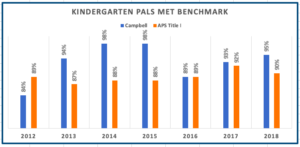
Beginning in 2012, Campbell staff embarked on a journey of school improvement. First, student behaviors and social emotional needs were addressed school wide. Special education, reading, math and ESL service delivery models were examined and adjusted. Teachers worked with administrators to create weekly grade level PLC meetings in which teams studied student growth, data and interventions. Capacity was built within the school regarding research based interventions. In 2014, student engagement and stamina increased with the adoption of a reading and writing workshop model. Around 2016, teachers began to implement math workshop as well. EL best practices have complimented district practices to improve instructional outcomes for students at Campbell.
 Contact
Contact  Calendars
Calendars Careers
Careers Engage
Engage  District
District

